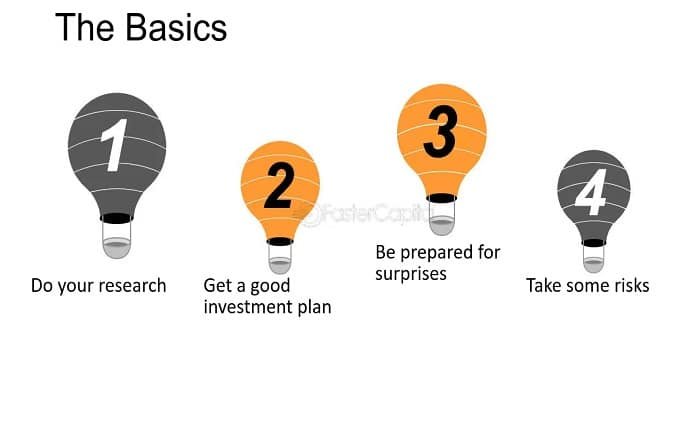Best Things to Invest In: A Comprehensive Guide to Smart Investments

Investing is an essential component of building and maintaining wealth. With numerous investment opportunities available, knowing where to allocate your resources can be challenging. To help you navigate this complex landscape, we’ve compiled a list of the best things to invest in, ensuring you make informed decisions to achieve your financial goals.
Stocks
Stocks are often considered one of the best things to invest in due to their potential for high returns. By purchasing shares of publicly traded companies, investors can benefit from the growth and profitability of these businesses. Diversifying your stock portfolio across various industries and market capitalizations can mitigate risk and enhance long-term gains.
Investing in stocks requires thorough research and a solid understanding of market trends. It’s crucial to analyze a company’s financial health, management team, and competitive positioning before making a purchase. Many investors also choose to invest in index funds or exchange-traded funds (ETFs), which offer broad exposure to the stock market with lower risk.
Bonds
Bonds are another excellent option for those seeking stable returns and lower risk. As debt instruments, bonds are issued by governments, municipalities, and corporations to raise capital. When you invest in bonds, you essentially lend money to the issuer in exchange for periodic interest payments and the return of the principal amount at maturity.
Bonds are among the best things to invest in for conservative investors or those looking to diversify their portfolios. They offer a predictable income stream and can act as a hedge against stock market volatility. It’s essential to consider the credit quality, interest rate environment, and duration of bonds when selecting your investments.
Real Estate
Real estate is a tangible asset that has historically provided substantial returns and acted as a hedge against inflation. Investing in property can generate rental income, appreciation, and tax benefits, making it one of the best things to invest in for long-term wealth creation.
There are various ways to invest in real estate, including purchasing residential or commercial properties, investing in real estate investment trusts (REITs), or participating in real estate crowdfunding platforms. Conducting thorough due diligence, understanding local market dynamics, and maintaining proper property management are crucial for success in real estate investing.
Mutual Funds
Mutual funds are pooled investment vehicles managed by professional fund managers, making them one of the best things to invest in for individuals seeking diversified exposure without the need for extensive research. These funds invest in a diversified portfolio of stocks, bonds, or other securities, spreading risk across multiple assets.
Investing in mutual funds allows you to benefit from the expertise of fund managers and achieve diversification with relatively small amounts of capital. It’s important to understand the fund’s investment strategy, fees, and past performance before investing. Mutual funds can be actively managed, where fund managers make investment decisions, or passively managed, such as index funds that track a specific market index.
Cryptocurrencies
Cryptocurrencies have emerged as a new and exciting asset class, offering significant potential for high returns. As digital or virtual currencies, cryptocurrencies use cryptography for security and operate on decentralized networks based on blockchain technology. Bitcoin, Ethereum, and other altcoins have gained popularity as some of the best things to invest in for those willing to take on higher risk.
Investing in cryptocurrencies requires a deep understanding of the technology, market dynamics, and regulatory environment. It’s crucial to diversify your holdings and stay informed about the latest developments in the crypto space. While the volatility of cryptocurrencies can be daunting, many investors see them as a way to achieve substantial gains and hedge against traditional financial systems.
Precious Metals
Precious metals, such as gold, silver, platinum, and palladium, have been valuable stores of wealth for centuries. They are considered some of the best things to invest in during economic uncertainty or market volatility. Precious metals can provide a hedge against inflation and currency devaluation, offering stability in times of financial turbulence.
Investing in precious metals can be done through physical ownership (buying bullion or coins), exchange-traded funds (ETFs), or mining stocks. Each method has its advantages and risks, so it’s essential to choose the one that aligns with your investment goals and risk tolerance. Monitoring market trends and geopolitical factors can help you make informed decisions when investing in precious metals.
Peer-to-Peer Lending
Peer-to-peer (P2P) lending platforms connect borrowers with individual lenders, offering an alternative to traditional banking. By investing in P2P loans, you can earn interest income from borrowers, making it one of the best things to invest in for those seeking passive income.
P2P lending allows investors to diversify their portfolios by lending small amounts to multiple borrowers, spreading the risk. It’s important to research the platform’s credibility, borrower creditworthiness, and default rates before investing. While P2P lending can provide attractive returns, it also carries the risk of borrower defaults, so diversification and thorough due diligence are crucial.
Exchange-Traded Funds (ETFs)
ETFs are investment funds traded on stock exchanges, similar to stocks. They offer diversified exposure to a specific index, sector, commodity, or asset class, making them one of the best things to invest in for those seeking diversification and liquidity.
Investing in ETFs provides the benefits of diversification, low costs, and ease of trading. There are various types of ETFs, including equity ETFs, bond ETFs, commodity ETFs, and sector ETFs. Understanding the underlying assets, expense ratios, and market conditions is essential for selecting the right ETFs for your portfolio. ETFs can be an excellent choice for both novice and experienced investors.
High-Yield Savings Accounts
High-yield savings accounts are among the best things to invest in for individuals seeking low-risk, easily accessible returns. These accounts offer higher interest rates compared to traditional savings accounts, allowing your money to grow with minimal risk.
While the returns from high-yield savings accounts may not be as substantial as other investment options, they provide liquidity and security. It’s essential to compare interest rates, fees, and account features across different banks and financial institutions to maximize your returns. High-yield savings accounts are ideal for emergency funds or short-term savings goals.
Collectibles and Alternative Investments
Collectibles and alternative investments, such as art, antiques, wine, and classic cars, can offer unique opportunities for wealth creation. These tangible assets can appreciate over time and provide a hedge against market volatility, making them some of the best things to invest in for those with a keen eye for value.
Investing in collectibles requires specialized knowledge and a passion for the asset class. It’s crucial to research market trends, provenance, and authenticity before making a purchase. Alternative investments can also include hedge funds, private equity, and venture capital, which often require higher capital and carry greater risk. Diversifying your portfolio with a mix of traditional and alternative investments can enhance your overall returns.
Conclusion
Identifying the best things to invest in requires careful consideration of your financial goals, risk tolerance, and investment horizon. Stocks, bonds, real estate, mutual funds, cryptocurrencies, precious metals, P2P lending, ETFs, high-yield savings accounts, and collectibles offer diverse opportunities for wealth creation and preservation. By diversifying your portfolio and staying informed about market trends, you can make informed investment decisions and achieve financial success.
FAQs
1. What are the best things to invest in for beginners? For beginners, the best things to invest in are typically low-risk, easily accessible options such as high-yield savings accounts, ETFs, and mutual funds. These investments offer diversification and professional management, making them suitable for those new to investing.
2. Are cryptocurrencies a good investment? Cryptocurrencies can be a good investment for those willing to take on higher risk and volatility. They offer significant potential for high returns but require a deep understanding of the market and technology. Diversification and thorough research are essential when investing in cryptocurrencies.
3. How can I diversify my investment portfolio? Diversifying your investment portfolio involves spreading your investments across various asset classes, such as stocks, bonds, real estate, and precious metals. This strategy helps mitigate risk and enhances potential returns by not relying on a single investment type.
4. What are the benefits of investing in real estate? Investing in real estate offers several benefits, including rental income, property appreciation, and tax advantages. Real estate is a tangible asset that can provide a hedge against inflation and market volatility, making it a valuable addition to any investment portfolio.
5. How do I choose the right mutual fund to invest in? Choosing the right mutual fund involves evaluating the fund’s investment strategy, past performance, fees, and the expertise of the fund managers. It’s important to align the fund’s objectives with your financial goals and risk tolerance. Research and professional advice can help you make an informed decision.





